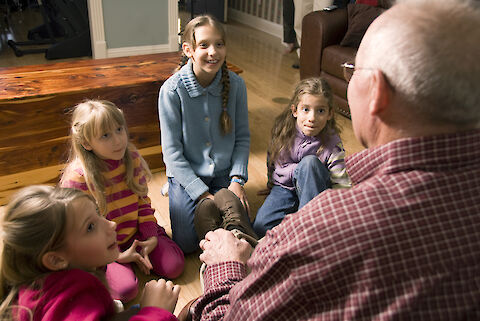
Alzheimer's patients gradually lose their capacity to learn, perform, and remember. Families, particularly children, may be significantly impacted by the disease. It might be difficult to know what to say to your kids when they first notice their parent's dementia. And unfortunately, there isn't a single right response. Each scenario is distinct, as is each child.
Even adults in Erie have difficulty understanding how Alzheimer's affects the mind and body and identifying the best method to manage new and increasing symptoms. How parents manage the issue directly impacts how children perceive the condition and whether they engage with their grandparents.
How to Explain Alzheimer's to a Child
Spending time together is helpful for kids and senior loved ones who have Alzheimer's, but it's crucial to make sure your kids are aware of what's happening to their grandparents and how to handle it. If they're spending the holidays with a grandparent, and you don't want anybody to be worried or frustrated, here are some actions you can take to help everyone enjoy family gatherings.
1. Do a Little Research on Your Own
Spend some time learning about the condition before speaking to your kids. By doing so, you'll be more equipped to answer your children's queries and explain the illness to them. Talking about the problem with your kids helps reassure them that you have control of the situation.
2. Keep Things Simple
Give your kids the clearest possible explanation of what's happening with their grandparents. This will help them comprehend. Instead of explaining the plaques and tangles, tell them their grandparent has a disorder that makes it difficult for them to recall things.
3. Encourage Communication
Kids are more perceptive than we give them credit for. It's important to avoid shielding a grandchild from Alzheimer's since honest communication can make the condition less frightening. Encourage children to ask questions and express their views and worries about the condition.
4. Don't Push It
If children can visit their grandparents frequently while the disease progresses gradually, they will be better equipped to deal with the changes in their grandparents. However, if your child gets apprehensive about visiting, let them know you understand how difficult it is since it is difficult for you as well. Consider a compromise that allows them to visit less regularly. Forcing your children to interact with a family member with Alzheimer's is not in their best interests. This might aggravate both the youngster and the grandmother during a visit.
5. Facilitate Their Interaction
Spending peaceful time together is vital, but so is commemorating memorable family days. Don't stop enjoying special occasions like holidays; doing so can alienate your family and increase your sense of loss. Consider name tags (in a large font) for everyone at family gatherings. People with dementia want visual clues, and name tags would be useful because grandchildren (and great-grandchildren) grow up swiftly and change so much over the years.
Talking to kids about their grandparent's Alzheimer's condition is crucial, just like other crucial conversations. Remember that kids have greater emotional awareness than we acknowledge them for. They'll probably adjust to these changes more easily than you think if given the proper assistance, including honest and forthright communication. Accepting their emotional reaction to the circumstance and showing patience, especially if you are already exhausted, will be critical to helping each other through this tough time.
At Senior Helpers Erie, we understand how tough it is to care for a loved one while also caring for your own young children. We offer support for conditions including Parkinson's, Alzheimer's, and other chronic illnesses. We also provide a wide range of other services throughout the counties of Erie, Mill Creek, Fairview, Harborcreek, Waterford, Meadville, and Crawford. Contact us today to learn more about how we can help your loved one.